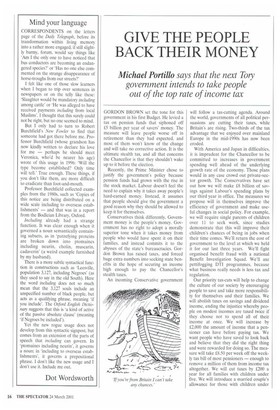GIVE THE PEOPLE BACK THEIR MONEY
Michael Padilla says that the next Tory
government intends to take people out of the top rate of income tax
GORDON BROWN set the tone for this government in his first Budget. He levied a tax on pension funds that siphoned off £5 billion per year of savers' money. The measure will leave people worse off in retirement than they had expected, and most of them won't know of the change and will take no corrective action. It is the ultimate stealth tax, and all that concerns the Chancellor is that they shouldn't wake up to it before the election.
Recently, the Prime Minister chose to justify the government's policy because pension funds had grown with the rise in the stock market. Labour doesn't feel the need to explain why it takes away people's hard-earned money. Instead, it assumes that people should give the government a good reason why they should be allowed to keep it for themselves.
Conservatives think differently. Government money is the people's money. Government has no right to adopt a morally superior tone when it takes money from people who would have spent it on their families, and instead commits it to the abysses of the state's bureaucracies. Gordon Brown has raised taxes, and forced huge extra numbers into seeking state benefits in the hope of securing an income high enough to pay the Chancellor's stealth taxes.
An incoming Conservative government will follow a tax-cutting agenda. Around the world, governments of all political persuasions are cutting their taxes, while Britain's are rising. Two-thirds of the tax advantage that we enjoyed over mainland Europe in the mid-1990s has now been eroded.
With America and Japan in difficulties, it is imprudent for the Chancellor to be committed to increases in government spending well ahead of the underlying growth rate of the economy. Those plans would in any case crowd out private-sector growth. The Conservatives have set out how we will make £8 billion of savings against Labour's spending plans by our third year in office. The measures we propose will in themselves improve the efficiency of government and make useful changes in social policy. For example, we will require single parents of children over 11 to seek work, since studies demonstrate that this will improve their children's chances of being in jobs when their time comes. We'll return the cost of government to the level at which we held it for our last three years. We'll fight organised benefit fraud with a national Benefit Investigation Squad. We'll axe pettifogging DTI programmes, because what business really needs is less tax and regulation.
Our priority tax-cuts will help to change the culture of our society by encouraging people to save and take more responsibility for themselves and their families. We will abolish taxes on savings and dividend income, ending the injustice whereby people on modest incomes are taxed twice if they choose not to spend all of their income at once. We will increase by £2,000 the amount of income that a pensioner can have before paying tax. We want people who have saved to look back and believe that they did the right thing and were rewarded for doing so. The measure will take £8.50 per week off the weekly tax bill of most pensioners — enough to remove a million of them from income tax altogether. We will cut taxes by £200 a year for all families with children under five. We will introduce a married couple's allowance for those with children under
11, which will be worth up to £1,000 off the couple's annual tax bill, enabling women in particular to have more choice about how to balance career and family responsibilities.
But our tax-cutting ambitions do not end with this £8 billion. Our commitment to control public expenditure so that it grows within the trend rate of growth of the economy means that the state will absorb a declining proportion of national income over time, and the scope to cut tax will increase, In the second half of the next Parliament, we hope to be able to cut taxes still further.
For example, I would like to see the inheritance-tax threshold increased so that fewer families are penalised for building up an inheritance. Of more pressing concern, though, is the level at which people are liable for higher-rate tax, which is now just £29,400 of taxable income. Supertax was designed to hit the very rich. But these days the higher rate catches people who are on middle incomes. The problem is particularly acute in London and other high-cost areas, where it is difficult to find a small flat to buy for under £150,000 and where the cost of living generally is high.
Tens of thousands of public servants are now being forced to pay tax at the top rate. Virtually all head teachers (and many deputy heads) are now higher-rate taxpayers, as are top-grade nurses in London and police inspectors across the country.
More and more people are being sucked into the higher-rate bracket because of 'fiscal drag'. Each year, hundreds of thousands of people get pay rises above inflation and find themselves dragged into higher-rate tax because the threshold is increased only in line with prices. Anyone earning more than 13/4 times average earnings now pays top-rate tax. Only ten years ago, you had to earn more than double average earnings to be caught in the net.
Although 'fiscal drag' is not a new concept, the problem is getting worse under Labour, In the last three years of Conservative government the number of higherrate taxpayers was stable at around two million. That figure has jumped by about 650,000 since Labour came to power. It's one reason why Gordon Brown has had so much money in his coffers.
When resources allow, the next Conservative government will deal with this problem by increasing the amount which people can earn before they pay top-rate tax.
The record of this government has been one of hidden tax increases on savers, pensioners and hard-working people. The next Conservative government will encourage people to save so that they can face the future with confidence, and will cut taxes so that people can enjoy more choice. Britain is overtaxed and people must be allowed to keep more of what they earn.















































































 Previous page
Previous page